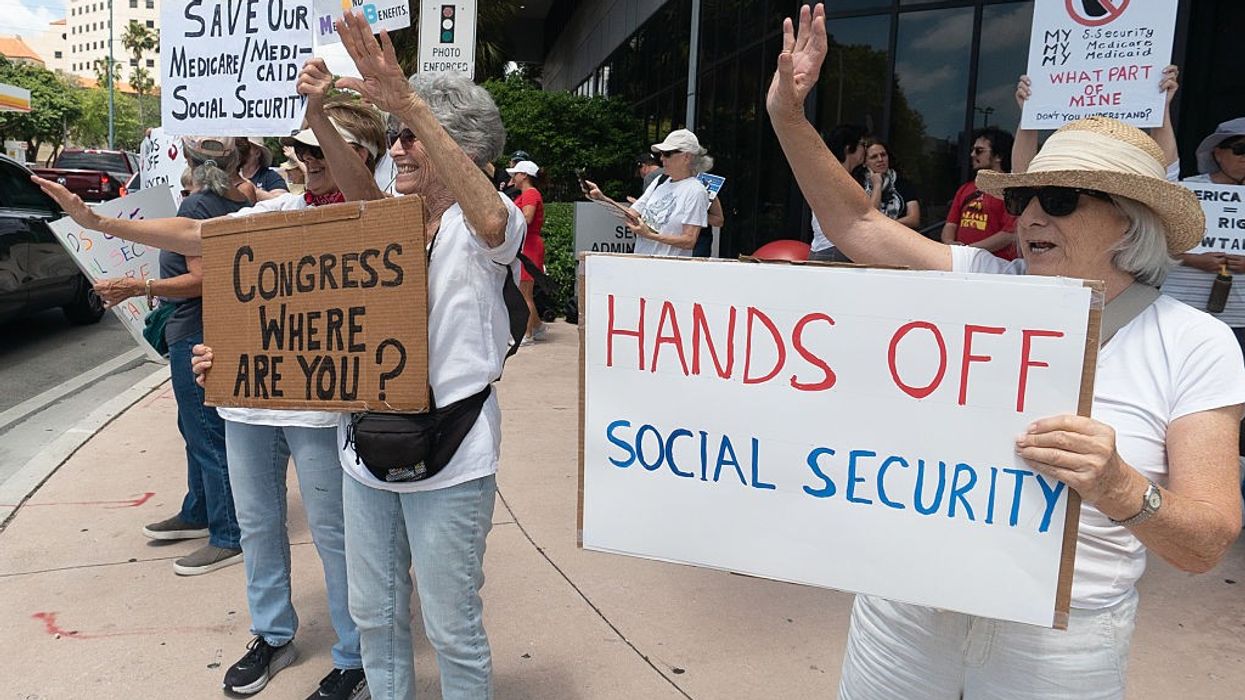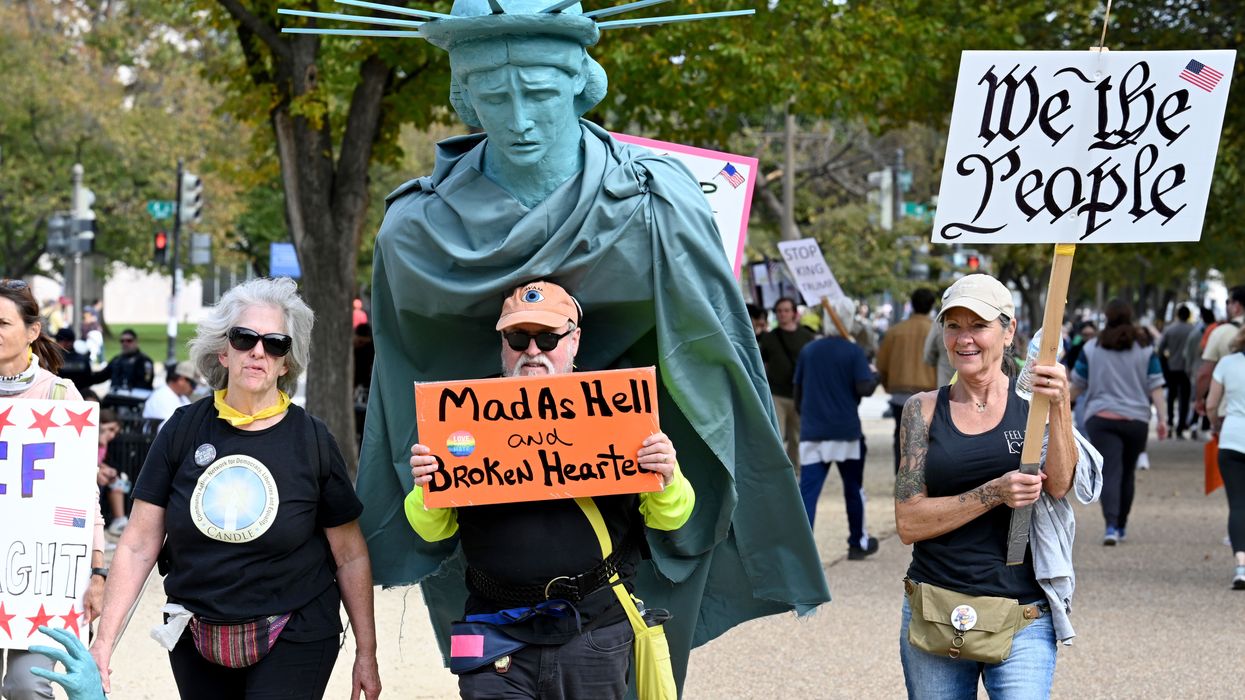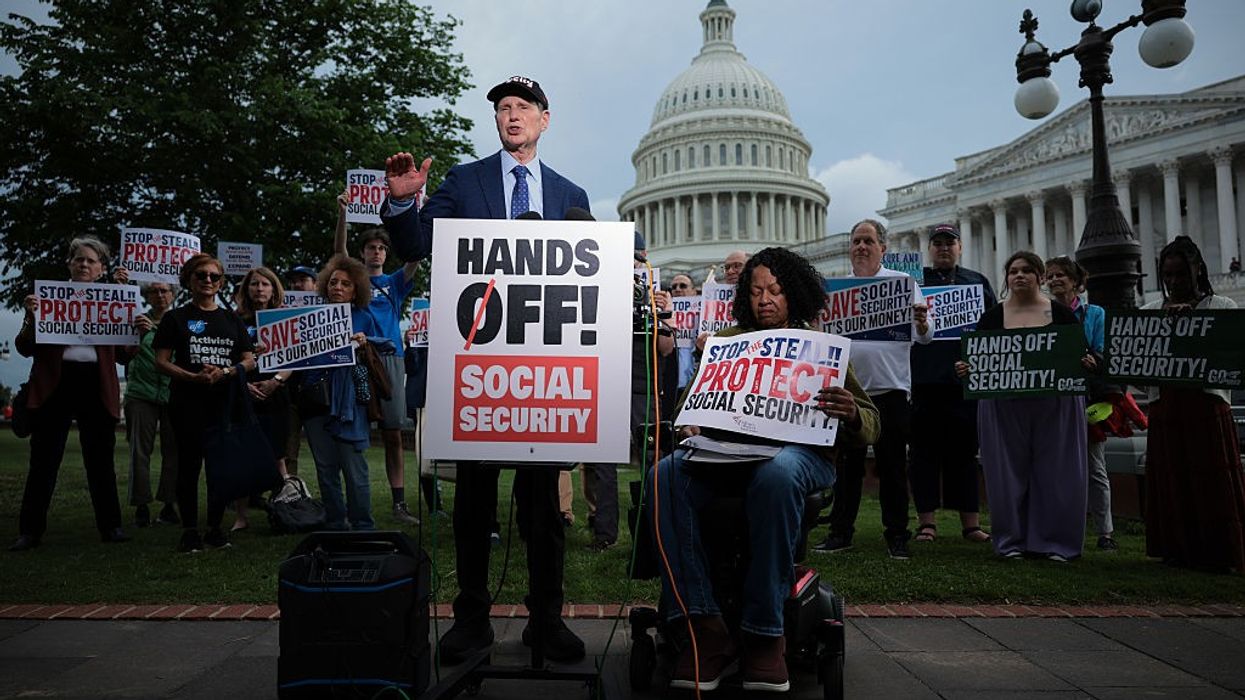Trump Is Making Older Americans Unsafe, and He Doesn't Care
When before has a president been so personally and negatively intrusive in the lives of seniors?
Aging, like time, ticks on, day by hour by day. Then, suddenly, it’s there, mocking our inability to sweep aside, should we even want to, this iron curtain. For seniors, the concept of time itself differs from that of younger people, because the future is in the everyday.
But aging in a Trumpian world brings fear and destruction as strand by strand of the safety net is plucked away until it’s shredded. And Donald Trump doesn’t care.
Seniors make up an ever larger American demographic that’s being made ever more unsafe in the richest country in the world. Social Security, healthcare, even access to food, not to speak of general well-being are all under threat. Trump doesn’t care.
The President’s Heavy Hand
Social Security is a return on what workers have paid into the federal government over many years. The recent fright about Social Security offices closing or seniors having to prove they’re eligible (or that they even exist) in order to continue receiving what workers 62 and over are owed is not only demeaning and insulting but also saps confidence, threatens well-being, and challenges life in America as we’ve known it. And count on one thing: Trump doesn’t care.
An aging society now under siege should be everyone’s problem since (if we’re lucky) we all get old.
The Social Security Department is run extremely efficiently and had no need for Elon Musk, Donald Trump, and crew remaking it. Less than one penny of every dollar it gets is spent on its administration, while the other 99 cents come back in benefits.
Social Security has been called a crucial guardrail against government change, a rail that, unfortunately, seems to be weakening, month by month, in the second era of Donald Trump amid changes so thoughtless that they take one’s breath away. For example, some Social Security offices are now being closed, ensuring that many elderly or infirm people who are housebound will no longer be able to reach them by phone to register to receive their checks. Yes, cruelty before our very eyes. Rep. Rashida Tlaib (D-Mich.) has insisted that we must defend this lifesaving program, which lifts 27 million Americans out of poverty each year.
In recent weeks, President Trump has announced an end to the issuing of the paper Social Security checks that now arrive by mail, rather than being deposited directly into a bank account. Doesn’t he know that it’s the oldest, sickest, and poorest among us who may not have a bank account, or be able to get to a bank, or make the change via computer, or who—yes!—may not even have a computer? Of course, Trump doesn’t care.
Health Care in Danger
Worse yet, Americans face drastic cuts to an entire healthcare system: Medicaid, Medicare, and the Affordable Care Act (aka Obamacare).
Congress was until recently shut down thanks to the opposition of the Democrats to a bill that contains huge cuts to Medicaid and doesn’t extend subsidies for Obamacare. Such cuts, if carried out, will affect millions of seniors and result in the closing of nursing homes and clinics, especially in rural areas and inner cities. If that bill were to pass into law, millions of people would lose a substantial part of their healthcare, with the most damaging and profound effects felt by an aging population.
It’s no secret that seniors have more healthcare problems than younger people. In an aging population, health and wellness are spiraling situations filled with sudden problems like falls, or slowly developing problems like arthritis and osteoarthritis, or simply the endless strain on worn-out joints and ligaments. Cancer, too, is more prevalent in people over 65.
Women, in particular, would feel the pain of such cuts, were they to happen.
Women use the healthcare system more than men do. Recently, Ms Magazine pointed out that women make up the majority of Medicaid recipients, both because they’re more likely to be caregivers and because they’re more likely to need long-term care as they age.
Veterans who fought in the Vietnam War of the last century and the Gulf wars of this century are also in that aging demographic. And like all aging bodies, theirs will register more health needs as the Trump administration cuts the Department of Veteran Affairs and VA hospital staff whose numbers have fallen every month since Trump was inaugurated a second time.
How all of this will affect or damage individual mental health is still being discovered. As a start, however, sickness, hunger, and the lack of enough money for emergencies can result in depression, fear, and far worse. And right now, sadly enough, the heavy hand of the Trump administration continues to press down on the general well-being of seniors (especially those on disability).
Unprotecting Seniors
Clearly, the Trump administration is more interested in self-care than senior care. Why else enact a bill to remove earned healthcare protections that have long been the expected staples of an aging life? When before has a president been so personally and negatively intrusive in the lives of seniors?
Food insecurity is now a fact of life in an aging demographic where nutrition is synonymous with health and longevity, in short with life or death. Though nutrition is necessary for young and old alike, it’s a must for the aging body. Yet food insecurity is now being experienced by millions of seniors, a future threat that has become a present reality.
I’ve written of hunger before, what it feels like to be a poor child growing up. Now, the question must be asked again in a different context: What does it feel like to be old and hungry? Trump doesn’t care.
At a time when the cost of living for essentials—food, rent, and healthcare—continues to rise, the dependence of seniors on the government’s care for the safety net is being whittled away.
The Supplemental Nutrition Assistance Program, better known as SNAP (think food stamps), is having its funds cut drastically. Until recently, SNAP provided significant amounts of food for poor families, though it was never quite enough. Supplies of food from farms and elsewhere that help stock rural as well as inner-city food banks have also decreased due to cuts in funds, including for food banks run by state, city, and church organizations.
Presently 4.8 million seniors 60 and older receive food via SNAP. However, it’s estimated that many more eligible seniors are not receiving food help. Attention must be paid: Seniors do not have enough to eat and—dare I repeat this in the richest country in the world?—Trump doesn’t care, but we must.
Past administrations have opted for less government but without tearing away as much of the safety net as the Trump administration continues to do. His cuts are careless, dangerous, and done without either significant thought or understanding. An aging society now under siege should be everyone’s problem since (if we’re lucky) we all get old.
Recently in Great Britain huge numbers of the elderly turned out en masse to shout ENOUGH, give us what we need, what we’ve earned, so that we can live with food, shelter, and our earned rest after years of work. Isn’t it time for elderly Americans, too, to turn out en masse to shout out our anger, dismay, and refusal to be placed in such a dangerous situation?
Project 2025, Russell Vought’s project to reshape the government in a second Trump presidency (about which Trump swore, during the election campaign, that he knew nothing) chronicled well ahead of time all that he and his administration are now doing to the detriment of us all, but especially to seniors. The Trumpian version of the invocation that we should all pull ourselves up by our bootstraps in no way takes into account the millions of people who have no boots with straps to pull up.
It’s also important to emphasize that all of this is happening in the richest country in the world, one that spends tens of millions of dollars to build a single jet fighter plane, and yet is now cutting funds to programs that help people get enough to eat. Our fury needs to be demonstrated.
The destruction being visited on an aging demographic doesn’t discriminate. It includes many seniors who wear MAGA caps, too. (Perhaps Trump doesn’t care about them either.) We can only hope that their support for a president determined to offer them so little and take away so much will diminish.
At a time when the cost of living for essentials—food, rent, and healthcare—continues to rise, the dependence of seniors on the government’s care for the safety net is being whittled away. Trying to keep the heat and electricity going, the water running, and food on the table is hard enough on a fixed income without having to worry about what President Trump and his Project 2025 cronies plan to take away from us next.
So many of today’s seniors have been workers, activists, parents, and more, all of which has contributed to the well-being of this country, and they have earned care and rest, as well as access to enough food, healthcare, and shelter to get by in a reasonably comfortable fashion. Trump doesn’t care.
Yes, people of all ages feel the heavy hand of the Trump administration in their lives, but the elderly, the sick, and the poor feel it the most, especially those living on fixed incomes.
Our Rights, Our Dignity
Seniors must insist on their rights and respect for their dignity—and not only to each other but out on the streets of this country, supported by Americans of all ages. After all, seniors are someone’s grandparent, parent, sibling, aunt, uncle, cousin, neighbor, or friend.
Because anger at having needs refused, especially as you get older, eats away at your body and soul, expressing it is not only healthy but allows us to feel less alone and more empowered. The millions of us who went onto the streets on No Kings Day to say no to what this administration is doing demonstrated the power of numbers, which is not a small thing. In that context, taking senior fury to the streets, with the participation of younger people, couldn’t be more significant when it comes to publicizing the importance of our needs being met. To remain quiet, to “take it” (so to speak) will only help the Trump administration hide the devastation now being visited upon us.
At 79 years old, Donald Trump has all his health, wellness, and food needs taken care of. His life is the assured good life, with hours of rest at his golf clubs. We seniors need to disturb that rest.
Here are some of the worries being expressed daily by seniors:
If my Social Security check doesn’t arrive on time or the funds are mysteriously cut, how will I survive?
If Medicaid is cut, how will I be able to get cataract surgery, or hernia surgery, or steroid injections for my pain?
Without Medicaid, how will I afford an ambulance to get to a hospital in an emergency?
Will lack of funds close my food bank?
And those are just a sampling of the daily worries impeding the earned rest of us seniors.
Statistics: Cold numbers can tell a truth but still do not accurately represent the stress that cutting funds will cause. Follow the dots from those cuts to a small house in the rural south, a cold apartment in an urban high rise, or the “gray wave” of homeless seniors sleeping on the streets, and it’s there you can see such statistics in action, taking the form of worry, illness, hunger, and insecurity. And all of that is happening as Trump permits millions of dollars to be spent on upgrading and furnishing a gift plane from Qatar. Again: In the richest country on earth, how can we allow such treatment to go on without raising our voices? We can’t. We mustn’t.
At 79 years old, Donald Trump has all his health, wellness, and food needs taken care of. His life is the assured good life, with hours of rest at his golf clubs. We seniors need to disturb that rest, become the thorn in his side. We must loudly proclaim our right to feel safe, to be free from hunger and assured of our healthcare and shelter.
Trump rules by fear, the use of which keeps many of us from demonstrating our outrage publicly. Hopefully, seniors who have already lived long and experienced so much won’t be silenced by such fear. We have a collective voice. Numbers matter on the streets and at the ballot box, at town halls and in the hallways of Congress. Along with younger generations who will one day be seniors themselves, it’s time for us to shout NO to all the ways senior needs are now being undermined and ignored. How dare Trump tarnish our golden years!
Unfortunately, an entire society, both young and old, is today experiencing an authoritarian threat to our lives. The insecurity it produces has shaken the very foundations of our American world and so makes it difficult for an aging population to hold on, to remain steady. Yet seniors are the very people who have helped to build this country in ways too numerous to list.
The present leadership protects its power instead of its people. In particular, the Trump administration threatens Black and brown seniors in shameful, racist ways. History has shown that what’s now called DEI (diversity, equity, and inclusion) has long been part of the backbone of a thriving society. Among other things, Trump’s indiscriminate actions against immigrants are beyond immoral and reach into the homes of seniors, too. (Where does he think his grandparents, his mother, and two of his wives came from?)
As long as voices are raised, anger shared, and street corners filled with demonstrators, hope remains. Throughout history wrongs have been righted by significant numbers of people of all ages refusing to comply. Now is the time to do what history has taught us or, like a dropped ball of yarn, this society will spool too far away to retrieve.


